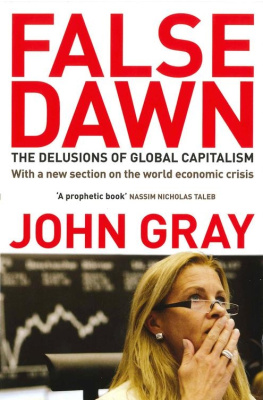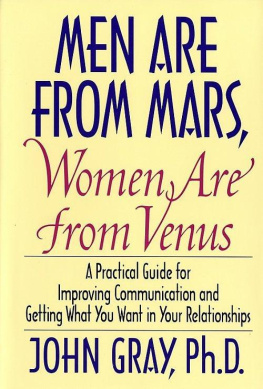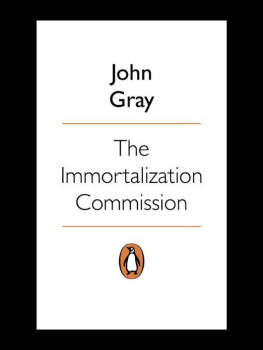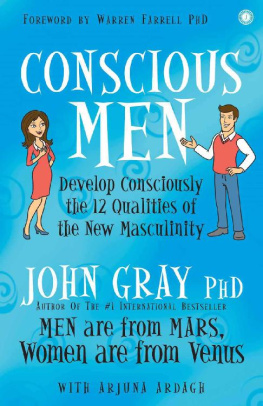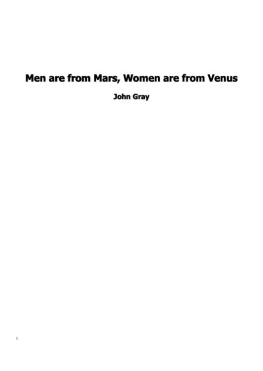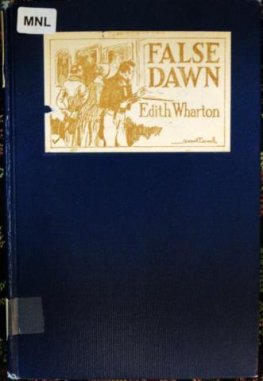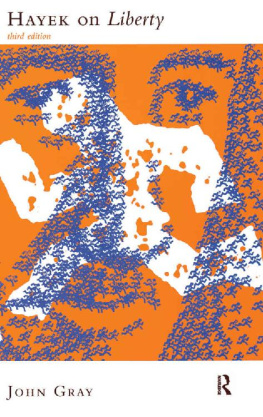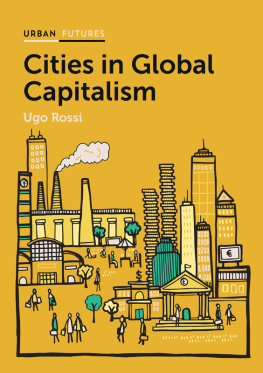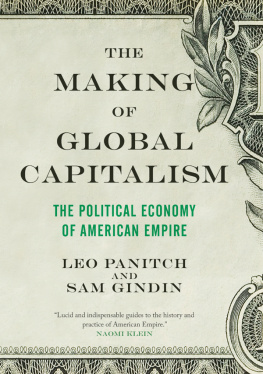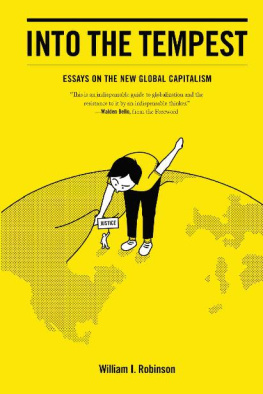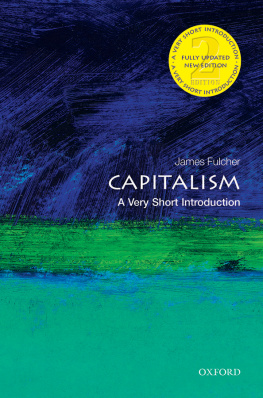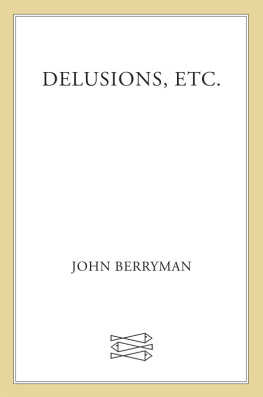John Gray - False Dawn: The Delusions of Global Capitalism
Here you can read online John Gray - False Dawn: The Delusions of Global Capitalism full text of the book (entire story) in english for free. Download pdf and epub, get meaning, cover and reviews about this ebook. year: 2009, publisher: Granta, genre: Politics. Description of the work, (preface) as well as reviews are available. Best literature library LitArk.com created for fans of good reading and offers a wide selection of genres:
Romance novel
Science fiction
Adventure
Detective
Science
History
Home and family
Prose
Art
Politics
Computer
Non-fiction
Religion
Business
Children
Humor
Choose a favorite category and find really read worthwhile books. Enjoy immersion in the world of imagination, feel the emotions of the characters or learn something new for yourself, make an fascinating discovery.
False Dawn: The Delusions of Global Capitalism: summary, description and annotation
We offer to read an annotation, description, summary or preface (depends on what the author of the book "False Dawn: The Delusions of Global Capitalism" wrote himself). If you haven't found the necessary information about the book — write in the comments, we will try to find it.
False Dawn: The Delusions of Global Capitalism — read online for free the complete book (whole text) full work
Below is the text of the book, divided by pages. System saving the place of the last page read, allows you to conveniently read the book "False Dawn: The Delusions of Global Capitalism" online for free, without having to search again every time where you left off. Put a bookmark, and you can go to the page where you finished reading at any time.
Font size:
Interval:
Bookmark:
John Grays daunting account of contemporary culture and anarchy, False Dawn, as finely written as the best nineteenth-century political philosophy, was the most convincing book of the year for me Adam Phillips, Observer
Grays message is that the hell-for-leather pursuit of capitalism US-style, which is to say of the highly deregulated variety, is based on a number of false premises the result, in Grays none too comforting analysis, will not be the Utopia of a single, super-efficient, wealth-generating global market we were promised, but its opposite: a sort of permanent anarchy It is sharply written, draws on a wealth of practical and theoretical knowledge, and deserves to provoke more thinking than we have yet seen on a subject which could scarcely be more important Evening Standard
[Gray] was more right, sooner, than anyone else The great qualities of his book, as of him, are clarity and a kind of pungent scepticism, like strong unmilked, unsweetened tea. He writes assertively Independent
[Gray] concludes that the effect of unrestricted international free enterprise will be socially and culturally destructive Grays analysis combining what he thinks is essential for future stability with an explanation of why it cannot be provided is more apocalyptic than Utopian Guardian
[False Dawn] introduces a sense of economic and historical perspective to these dissident-free days Esquire
There are a great many people without whom I could not have written this book. Without the encouragment given me by Neil Belton I would not have begun, still less finished it. His unflagging support and incisive criticisms have been decisive at every stage. I could not have asked more from an editor.
Several people were kind enough to comment on all or part of the book. David Barron, Nick Butler, Colin Clarke, Tony Giddens, Will Hutton, James Sherr, Geoff Smith and George Walden all gave me helpful comments, and their conversation has stirred my thoughts on many of the themes of the book. Jane Robertson has made many invaluable suggestions at the copy-editing stage.
Since I have not accepted all of the suggestions made by any of the people who have read the book, and none of them would accept everything that I argue, all the usual disclaimers apply.
As in previous editions, the original text of False Dawn is reprinted here unaltered. I have not found it necessary to revise the central argument of the book, but I have added a new foreword to update the analysis in light of the financial crisis that erupted in 2007. I am grateful to Sara Holloway of Granta for her comments and suggestions. Responsibility for the book, including the foreword, remains mine.
John Gray, August 2009
Gatsby believed in the green light, the orgastic future that year by year recedes before us. It eluded us then, but thats no matter tomorrow we will run faster, stretch our arms farther And one fine morning
So we beat on, boats against the current, borne back ceaselessly into the past.
F. S COTT F ITZGERALD
In the era of the free market, now fast slipping from memory, the past hardly existed. Only the present had any reality, and it was being constantly refashioned and made new. New industries, new careers, new lives were continuously created, then discarded, according to market imperatives. Grandiose doctrines sprang up to support the belief that the free-market capitalism that had been adopted in a handful of countries would prevail over every other economic system.
The long boom, the weightless economy, the great moderation, the new paradigm and the flat world these and other wild fancies were recycled as established truths by politicians and journalists, economists and bankers, academics and supposedly hard-headed business future was dismissed as apocalyptic.
Of course it was the idea that global economic collapse could no longer happen that was truly apocalyptic. History does not stop. It continues, as evolving technologies interact with the unalterable human animal and old conflicts are given new twists. Governments may be better informed than they have ever been, but they are not any wiser and if politicians and their advisers believed the boom could go on for ever it was because they had lost any sense of history. Capitalism may be the most productive economic system that has so far developed but it has always been highly volatile. The idea that once released from government regulation the market would be self-stabilizing can only be explained in the context of the absurdly unrealistic world-view that prevailed in the twenty years after the collapse of communism.
Lasting over seven decades, during all of which it maintained its power chiefly by fear, the Soviet state passed out of existence, without significant violence, in two or three years. The sudden collapse of a regime that seemed unshakeable should have been taken as a warning that stability was not a realistic prospect in the years that would follow, and far from ushering in an era of peace the fall of communism was the prelude to an age of revolution. The downfall of American finance-capitalism is a similarly world-changing event. The US is not going to implode, and cease to exist, in the way the former Soviet Union did. A long, Argentina-style decline is the most likely upshot of the current crisis, but the US has been a far more powerful force in world affairs than Argentina ever was. As a result, the breakdown of the model of capitalism which the US incessantly urged on other countries, and even on occasion applied itself, looks set to reshape the global order in deep and lasting ways.
In the first edition of this book, published in March 1998, I wrote: Todays regime of global laissez-faire will be briefer even than the belle poque of 1870 to 1914, which ended in the trenches of the Great War( p. 7). Not much more than a decade ago this seemed outlandish, but there have since been many signs that global capitalism was heading for a fall. The Russian government defaulted on its debts, and a highly leveraged hedge fund, Long Term Capital Management, collapsed at the end of the nineties. The global financial system was saved, but only by the head of the American Federal Reserve Alan Greenspan forcing down interest rates to a level that triggered multiple bubbles. As a result the US itself became a massively leveraged hedge fund dependent for its solvency on continuing inflows of capital from foreign investors.
Now that Americas bubble economy has burst, the global market is being reconfigured. America was ready to embrace globalization only so long as it seemed the process would reproduce American capitalism. When financial crisis hit in 2007 the reaction of US policy-makers was predictable, and the US began to limit its exposure to globalized markets. When the Obama administration introduced buy-and-hire American policies in 2009 it was in line with a long tradition of American protectionism. The SmootHawley Act of 1930 raised tariffs on goods imported into the US, and by triggering tit-for-tat measures in other countries deepened the Great Depression. There is nothing yet to suggest an inevitable descent into war between great powers of the kind that happened in the 1930s, but now as then a worldwide economic dislocation will be followed by a long period of geopolitical upheaval.
As the global crisis unfolds there will be no miraculous alteration in human behaviour. People will turn to governments for security from the storm, while governments as always will be concerned chiefly with their own survival. Bank bail-outs have preserved the financial system from disintegration, while monetary expansion may have slowed the contraction in economic activity. But the growth produced during the bubble was unsustainable, and the attempt to restart it will be self-defeating. The eventual result will be inflation, and the reemergence of the resources scarcities that were visible before the crash, while governments will be further destabilized. The resulting situation will not mechanically replicate any that has existed in the past. The present crisis has some genuinely novel features, and it is at this point that it becomes more than a rerun of history.
Font size:
Interval:
Bookmark:
Similar books «False Dawn: The Delusions of Global Capitalism»
Look at similar books to False Dawn: The Delusions of Global Capitalism. We have selected literature similar in name and meaning in the hope of providing readers with more options to find new, interesting, not yet read works.
Discussion, reviews of the book False Dawn: The Delusions of Global Capitalism and just readers' own opinions. Leave your comments, write what you think about the work, its meaning or the main characters. Specify what exactly you liked and what you didn't like, and why you think so.

